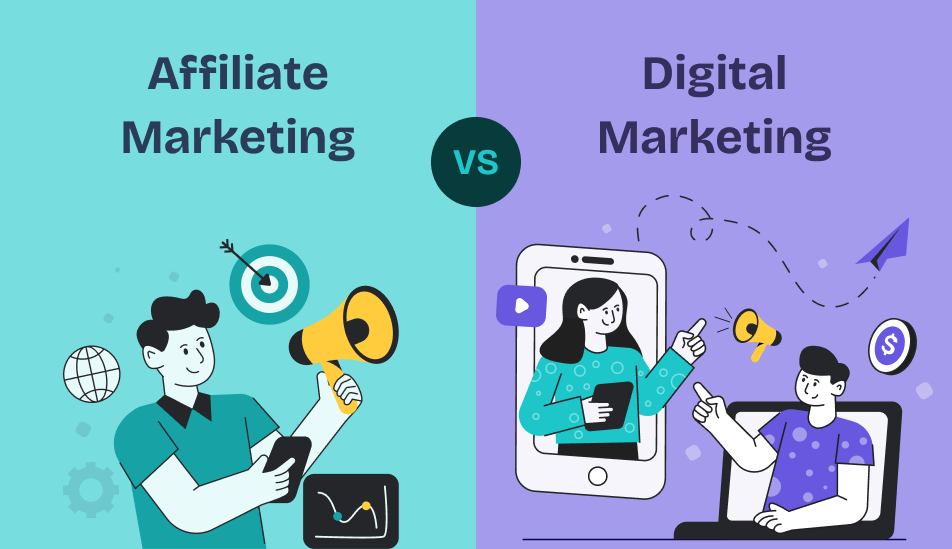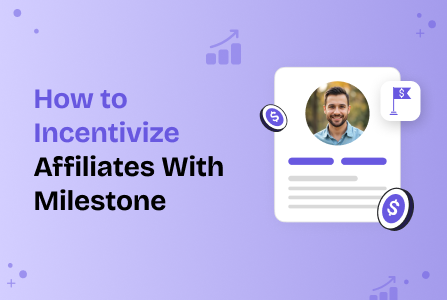Digital Marketing vs. Affiliate Marketing: Which is Better?

Digital marketing vs. affiliate marketing – how do they connect and differ? Surfing the web, you’ve probably heard multiple times how the terms digital marketing and affiliate marketing are tossed around.
If they are often used together, does that mean they are the same thing, or almost the same?
The answer goes as deep as clarifying every word: Can marketing exist without a ‘digital’ part? Yes. Do affiliates exist outside the computer screen? Sure. The same goes for affiliate marketing. It can be performed in the real world – and online as well.
But it all sounds like a conclusion right at the beginning of our story? Should not be so. That’s why we’re going deeper into the digital marketing vs. affiliate marketing difference right now. Let’s begin with the fundamentals.
Digital Marketing vs. Affiliate Marketing: Explaining the Terms
Digital marketing is the umbrella term that touches all the activities online – how you, as a business, promote your products or services on the internet rather than in the real world. A post on social media. Social media ads. Blog SEO. Paid Google Ads. Dropshipping. Newsletters. What else? Digital marketing is big and diverse.
Affiliate marketing is just a small thing within that umbrella – it can be performed online or offline. However, if we’re talking about the automatically tracked links in a strategy, when you partner with affiliates (bloggers, social media influencers, businesses, etc.) who promote you, that’s digital affiliate marketing.
People promote your products or services in exchange for a commission on each sale they drive in a way that they can. And that is tracked through special tools.
Is Affiliate Marketing Part of Digital Marketing?
Well, well, well… Yes.
Affiliate marketing falls under the digital marketing category because it happens entirely online. It relies on digital tracking tools, fully dependent on content, links, and promotions.
Digital marketing, however, includes things like your own ads or your own social media posts. But affiliate marketing means someone else is doing all the promotion for you – in exchange for something, let’s not forget (a mutually beneficial thing).
For example, a retailer selling shoes online may run Facebook Ads (digital marketing) while also having a network of fashion bloggers linking to their products with affiliate links through any possible channels (affiliate marketing).
Or, if we lean slightly more digital… a software company might use SEO to attract leads (digital marketing) while offering affiliates a cut when they bring in paying customers through referral links (affiliate marketing).
The goal is actually the same!
Sales through Facebook ads? Ticked. Sales through paid backlinks? Ticked. Sales through affiliate marketing? Ticked.
All above are approaches to digital marketing!
When Digital Marketing Makes Sense
Digital marketing is best when you want to fully control your brand message online across channels, including content platforms, social media, and search engines.
Then, you have all the cards to build a direct audience through email lists, social media, or ads by putting in some budget or time. Many companies scale and grow with paid campaigns online.
For example, if you’re launching a new app/service/course and want to get feedback or just some buzz around it, running Instagram and TikTok ads is a solid digital marketing step-in.
What’s the role of affiliate marketing in all this, then?
Pros and Cons of Affiliate Marketing
So, when in your growth cycle do you actually need affiliate marketing in your digital marketing routine? Are you ready to give those shares to partners? How easy is it to implement and manage the affiliate program online?
Like anything in business, affiliate marketing has ups and downs. The key ones usually named by businesses include:
Pros of affiliate marketing:
- You share only when a sale is made – you win in any case.
- Access to ready-made audiences (affiliates already have followers).
- Scalable (add more affiliates, get more reach).
Cons of affiliate marketing:
- Without the proper preps, you may get less control over the branding message.
- Commissions cut into profit margins.
- The cost of affiliate software is if you want to automate and scale.
So, the easy verdict is – the pros easily outweigh the cons if they multiply your potential customers long term.
The Easiest Way to Start Affiliate Marketing with WordPress
For WordPress sites that are actively practicing digital marketing through a variety of ways, setting up affiliate marketing is much easier than you might think.
Firstly, because affiliate plugins simply amplify the work of e-commerce and any other plugins that you use. You don’t need to do anything special extra except for connecting commission-based tracking of sales.
This is easily done by fully dedicated affiliate plugins like AffiliatePress for WordPress.
It can do the heavy lifting the easy way. All you need to do is:
- Install AffiliatePress on your WordPress site.
- Define commission rates (e.g., 10% per sale). There are multiple commission types, including based on performance or groups of affiliates.
- Set up affiliate registration so new partners can sign up.
- Provide tracking links, QR codes, coupon codes, or landing pages automatically to affiliates.
- Watch as affiliates promote your products and bring in sales. Track everything in one dashboard.
AffiliatePress already integrates with a nice list of top used (23+) WordPress plugins of all goals and sizes. A few examples:
- WooCommerce, EDD, SureCart, and other plugins for selling things online.
- Paid Memberships Pro, ARMember, Restrict Content Pro + many other membership WP plugins that sell subscriptions and content access.
- LearnDash, LifterLMS, and other LMS and education plugins.
- Multiple form plugins, including Gravity Forms.
- BookingPress.
- GiveWP and GetPaid.
Ready to scale your revenue? Firstly, see how it works in real life with affiliate marketing dashboards. Invest your time before investing your money.
What’s Better: Affiliate Marketing or Digital Marketing?
So, is affiliate marketing the same as digital marketing? Not exactly, but it’s definitely a powerful part of it. Strictly saying, these terms are not directly comparable alternatives – one is a subset of the other.
To be more precise, affiliate marketing complements your digital marketing strategy – when it’s time to scale, grow, and automate your business. So a much better question is, is affiliate marketing the right choice compared to other digital marketing strategies?
The answer is, yes, especially in cases when you feel your business needs one more external sales team that helps you reach new audiences you wouldn’t get on your own.
To conclude, digital marketing is your complete online growth strategy, affiliate marketing being one of the most powerful approaches at the right moment in business. Is this the moment you’re experiencing?






